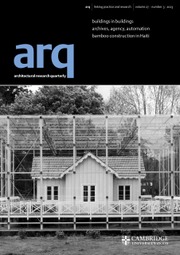No CrossRef data available.
Article contents
Spatial agency practice in Tai O Village: colonial legacies and spatial-architectural approaches to collaborative urban futures
Published online by Cambridge University Press: 12 March 2024
Extract
This paper discusses spatial agency practice within a living lab in Hong Kong. Lab members work in Tai O Village, a historic fishing settlement receiving increased attention due to remnant vernacular housing there. The article presents historical and policy context for ongoing casework conducted with stakeholders in Tai O. It presents Tai O’s history in brief, recent policy developments, and inherent conflicts arising from the interaction of the two. The third section of the article describes informal settlement land tenure conflicts as historical phenomena in Hong Kong. The paper follows this case-specific discussion with global literature review of selected regularisation and settlement upgrading efforts from around the world. These reviews present the article’s thesis that third sector and design-led efforts are critically applicable methods to address informal settlement conflicts that remain due to colonial legacy policies and political inertia. The final section of the article presents ongoing living lab research and initiatives, including collaborative monitoring projects and strategic development proposals. Each living lab initiative presented elaborates the article’s thesis on the interaction between architecture, research, and governance to negotiate complex development transitions. The article contributes to architectural scholarship by summarising unique interactions between history, policy, economics, and demography that engendered the development situation in Tai O. Further, it reflects upon response development methods through architectural science and spatial agency practice, including the role of architectural representation products and discursive distinctions at boundaries between architectural practice and spatial agency practice.
- Type
- Full Paper
- Information
- Creative Commons
- This is an Open Access article, distributed under the terms of the Creative Commons Attribution-NonCommercial licence (http://creativecommons.org/licenses/by-nc/4.0/), which permits non-commercial re-use, distribution, and reproduction in any medium, provided the original article is properly cited. The written permission of Cambridge University Press must be obtained prior to any commercial use.
- Copyright
- © The Author(s), 2024. Published by Cambridge University Press




